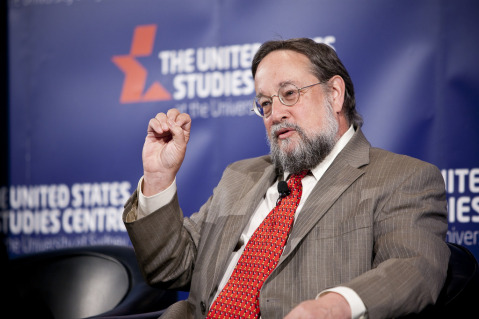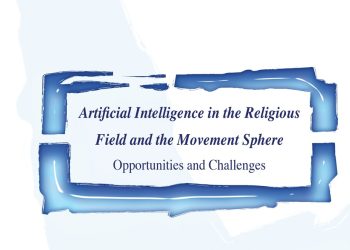Albert Einstein once quipped that, “only two things are infinite, the universe and human stupidity, and I am not yet sure about the universe.” Far be it from me to judge Einstein’s acumen or sense of humour, but I can say that, in my experience–and I now find myself amid my seventieth year’s worth of experience–two kinds of perceptual bias cause the most trouble to clear understanding of international political relationships. The first is the overestimation of the importance of one’s own country and region to great powers–the tendency, in other words, to distort the world as would looking through a fish-eye lens centered on one’s own location. The second is the tendency to focus on the superficial and near-term at the expense of the more profound and long-term.
Both forms of bias are natural to human nature, at least as manifest by the untutored, the inexperienced, or the intemperate of character, which, regrettably, describes most people most of the time. But both can be limited, at least sometimes and to some extent, by serious education and the maturity that comes from long engagement with challenging issues. That, in turn, is why sagacious leadership matters so much. The world is much too complex and messy for there to be unerring formulas that ordinary people can apply to complicated problems. Fine-tuned prudential judgment, aptly deployed, is a great rarity. Lacking it, which is unhappily too common as well, invites illusion usually followed by trouble for individuals, families, and nations alike.
The Illusion of Self-Importance
Southeast Asia and the Middle East are very different cultural zones, to be sure. But they are similar in that neither region is host to what is conventionally considered to be a great or “super”-power. The most populous nation in Southeast Asia, by far, is Indonesia (273.5 million); in the Middle East it is Egypt (102.3 million), with non-Arab Iran (83.9 million) and Turkey (84.3 million) not very far behind. But no country in either region is as populous as the United States, India, or China by a significant margin. Even Pakistan’s population is more than double Egypt’s, giving some sense of how relatively modest the size of Southeast Asian and Middle Eastern state populations are.
Just as it is very difficult for Americans, and Chinese and Indians, to wrap their minds around how very small countries imagine their security circumstances–Singapore in Southeast Asia and the United Arab Emirates in the Arab world work as examples, but so in Southeast Asia does Brunei and in the Arab world Qatar, Bahrain, Oman, and Kuwait–it is very hard for small and middle-size powers alike to imagine how populous, powerful, and often wealthy countries see the world. The most persistent asymmetry in international relations in recent decades rotates around the fact that most countries believe their bilateral relationship with the United States is very important to them–number one or two, or possibly three–which usually leads to them caring about and knowing more about the United States than the U.S. Government cares or knows about them.
Everyone is vulnerable to characteristic misperceptions that can arose from either side of a misperception. So this underappreciated asymmetry carries a common codicil: That we in the United States care as much about other countries and regions as those countries and regions care about us. This is just not so, for even big countries are just a fraction of the variance to U.S. policymakers. This would be true even if the United States were not a “world island” that is insular and self-absorbed to a degree that most foreigners cannot imagine.
Let me offer an example from Southeast Asia, but one that Middle Easterners will have little trouble “reading in” to their own circumstances. Having spent a year in Singapore, from late July 2019 to just a few weeks ago, I am on the radar of Singaporean and some other regional Southeast Asian journalists. Several days ago a journalist who works for the Chinese-language daily newspaper in Singapore that is part of the Straits Times Holding Company asked if he could put some questions to me about the implications of the upcoming U.S. election for Southeast Asia and Singapore. I agreed to answer his questions. Here, below, is one of his questions, and the answer I gave him. You will see from my bluntness that I was trying to correct the self-importance bias embedded in his question. (At my age I am not out to amuse others at the expense of truth.)
His Question: Southeast Asia is often viewed as a region that Trump’s administration shows particular interest, just to keep China in check. How do you think the strategic importance of the region will shift under a Biden administration?
My Answer: Is “often viewed” by whom? The Trump administration shows no special interest in Southeast Asia. What makes you think otherwise? What evidence do you have for that assertion? Ignoring nearly all the annual regional summits, which you yourself mention in your list of questions, that shows how much the administration cares?!?
If the U.S. foreign policy bureaucracy thinks about keeping China in check, as you say and as it of course does, it cares more about Japan, South Korea and India than it does about any Southeast Asian country. The only relevance Southeast Asia has is that it is the site of the political dispute over the South China Sea. That makes countries with territorial disputes with China, including the Philippines and Vietnam, more important than they would otherwise be to the United States.
But otherwise, the region is a hodgepodge of difficulties and irrelevancies. For example, Thai politics have for some years been descending into a dysfunctional pit. In the 1960s, 1970s and even the 1980s the U.S. Government would have cared a lot about that because of the tight-knitted conception of global rivalry in the Cold War. Today no U.S. administration will care much and a Trump or Trump-like administration won’t care barely at all. Same goes, pretty much, for Mahathir’s Malaysia (troublesome and feckless), Cambodia (irrelevant), Laos (even more irrelevant), Myanmar (disappointing as well as troublesome), Indonesia (meh….except for counterterrorism specialists taking an interest). So what’s left, really, for U.S. decision-makers to take a special interest in? Singapore? Don’t bet on it.
A Biden administration, should there be one, will not think very differently about Southeast Asia. It will continue to be a low-priority area save for the focus on the South China Sea issue, and in that context the countries in the region will be more props rather than actual subjects for U.S. policy. They will matter as accidents of geography, and that’s about all. There is no more ideological, Cold War-like contest for hearts and minds. A Biden administration will not revive a Carter-like approach to democracy promotion or human rights, unless human rights violations become so huge and egregious that they make politically un-ignorable headlines in the United States. And, finally in this regard, the idea that somehow ASEAN will congeal in a way to make the region more important than the sum of its national parts, a benign fantasy in some minds, is not taken seriously by experienced U.S. policymakers.
But Southeast Asia will be of special importance to China because Chinese leaders, whether the present ones or successors, will see Southeast Asia historically as a staging ground for assaulting and limiting China by Western maritime forces based in the region. China will have a permanent interest in overthrowing that historical legacy; U.S. administrations will not care as consistently or generally as strongly about using the region as a tool of its own China policy. The United States is not a mercantilist power. We in the United States will never see Southeast Asia as once did the Portuguese, Dutch, French, and British. You don’t need a weathervane, therefore, to know which way the longer-term prevailing winds will blow. The balance of interests always trumps–pardon the expression–the raw overall balance of power.
The Lure of the Superficial and the Immediate
So much for the bias toward exaggerated self-importance; how about the bias toward the superficial and the immediate over the significant and longer-term?
Let me again illustrate by patching together a few parts of my exchange with the aforementioned journalist.
His Question: Considering that Trump has made pretty bold moves ever since he took over, for example pulling out of TPP, not appearing for most US-ASEAN summits, etc., how would you define Trump’s “Free and Open Indo-Pacific” strategy in the region? Is it as important as Trump puts it? Has this form of strategy evolved over the years of his administration?
My answer: You use the phrase “bold moves.” I think “bold” is the wrong word because it typically connotes vision and positive creativity. That is not at all the case with the Trump administration. Pulling out of the TPP was one of the stupidest things imaginable: It took the United States away from the table where the “rules of the road” on global trade are set. It was an example of using a serious foreign policy issue for domestic political signaling. The institution goes on, of course, but without U.S. influence over its proceedings and conclusions, and the institutional outcomes that will arise from them.
Not showing up for regional summits is hardly bold by any stretch of the imagination. It simply reflects the fact that the region is not on the President’s mental map, and that he is generally uncomfortable around foreigners because he doesn’t understand much about them or really know where he is when he leaves the United States. He once saw a nighttime satellite photo of East Asia, designed to illustrate how backward North Korea is–in this case via the near non-existence of any reliable electricity grid–and thought that he was seeing a section of the Pacific Ocean. He doesn’t read and has never had a professional level reading discipline. His foreign policy optics spring from seat-of-the-pants egoism designed to draw and keep media attention. There is nothing “bold” about any of this.
As for the “Free and Open Indo-Pacific” strategy, this is just bureaucratic language, held over from previous administrations and doctored up a little bit by the Schedule C political appointees of the current administration. It reflects useful if superficial and insignificant policy continuity. U.S. policy has from the very beginning of the United States favored freedom of navigation and relatively unfettered international trade environments (despite a long period of high tariffs in the 19th century to product U.S. “infant industries”). The bureaucracy nowadays only has been able to make such noises and issue policy papers that foreigners read because the White House doesn’t care one way or the other. The President doesn’t even know the name of the policy; I would be surprised if he ever accepted an offer to be briefed on it. If a White House pool reporter/correspondent were to ask the President what the policy is or means, Trump would not know what to say and the reporter/correspondent would likely be disinvited to future briefings. So to say that it is “Trump’s policy” is quite a stretch. It suggests that this is a normal administration, with normal policy processes and a normal mix of political and policy-substantive concerns. It isn’t normal, not even close.
Those in East, Southeast and South Asia who think that because Trump has toughened U.S. policy toward China he is a better bet for their own interests than Joe Biden–and there are such people, from the Japanese Foreign Ministry to the highest offices in New Delhi–foolishly discount the longer term for the irritable mental gestures masquerading as ideas of the Trump rolling improvisational short run. The old policy won’t return thanks in large part to recent Chinese government behavior: The Democrats will not be less demanding on issues of trade and technology theft and they’ll be at least rhetorically tougher on Xinjiang, Tibet, and other neuralgic domestic/rights questions.
It is even harder to imagine how Trump’s domestic political behavior, which has weakened American institutions to include basic rule of law, trashed norms this way and that, further divided American society against itself, and sharply coarsened the nature of political discourse, can possible strengthen the United States in the long run and work in support of U.S. engagement in a constructive international role. Far more likely Trump’s behavior in office will lead to a more isolationist United States, but an isolationism punctuated by episodic unilateral outbursts of angry violence against others. It is beyond me how any serious person could think this kind of American orientation to the world could be good for international security, prosperity and peace.
The key policy issue at stake in the election is obvious, but it neither superficial nor immediate. Economic globalization is now in a shambles because of COVID, but it was ailing and much criticized before, too. World leaders need to work together to rebuild globalization, but in a way that makes it more resilient, less prone to shock damage, and more equitable within as well as among nations. This will take leadership in many countries that understands mutual and enlightened self-interest among different peoples and states. The United States cannot do this by itself, but the world can’t do it without the United States.
That means that countries like Singapore will benefit from the kind of U.S. leadership that is willing to work with others to mutual benefit. We need leadership that knows how to build, not just tear down, to concert effort, not just divide. That does not describe the zero-sum-brained Randians in the Trump camp. It describes people who understand both the uses and limits of liberal internationalism, limits defined by a heavy dose of patient realism. Joe Biden is not my favorite Democratic thinker; he never has been since I first met him in the Senate in 1977. But he is immeasurably more likely to do the right thing by way of building globalization back better than before than is anyone who looks, feels, or smells like Donald Trump.














